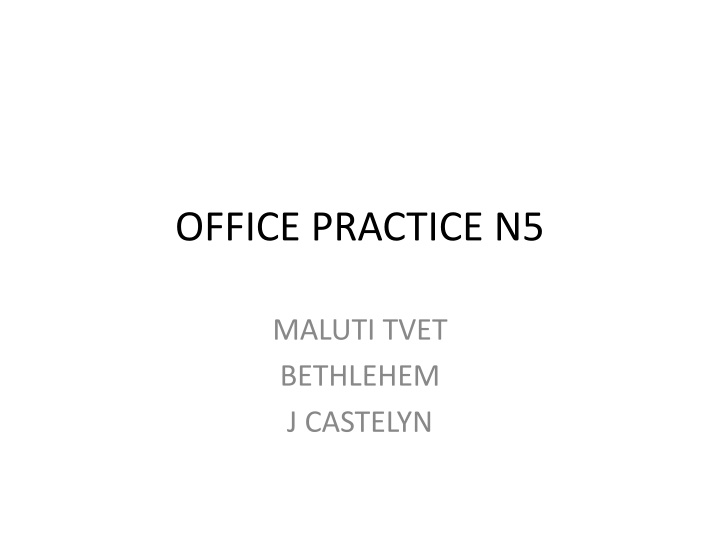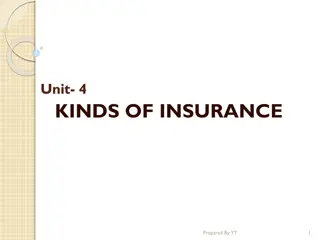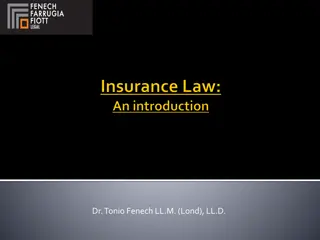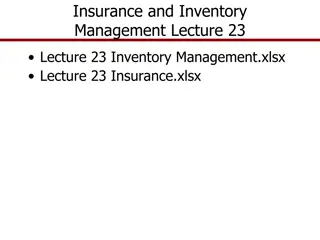Insurance: Definition and Differentiation
Explore the world of insurance with a focus on understanding the definition of insurance, differentiating between insurance and assurance, and exploring various types of insurance services available. Learn about the economic role of insurance, types of insurance, and the importance of insurance policies in protecting individuals and businesses from potential losses.
Download Presentation

Please find below an Image/Link to download the presentation.
The content on the website is provided AS IS for your information and personal use only. It may not be sold, licensed, or shared on other websites without obtaining consent from the author.If you encounter any issues during the download, it is possible that the publisher has removed the file from their server.
You are allowed to download the files provided on this website for personal or commercial use, subject to the condition that they are used lawfully. All files are the property of their respective owners.
The content on the website is provided AS IS for your information and personal use only. It may not be sold, licensed, or shared on other websites without obtaining consent from the author.
E N D
Presentation Transcript
OFFICE PRACTICE N5 MALUTI TVET BETHLEHEM J CASTELYN
Topic 7: auxiliary services INSURANCE
INSURANCE: DEFINITION: Insurance policy The client is promised compensation from the company (insurer) for a specific, potential future loss. In exchange, the client (insured) makes a monthly payment (premium). To protect the financial well-being of an individual, company or other entity in the case of unexpected loss. can be optional or required by law
DIFFERENTIATE: INSURANCE AND ASSURANCE INSURANCE: Is a contract whereby the insurer (company) undertakes, in return for the payment of a premium, to cover the losses suffered by the insured (person or business) as a result of a specific event. E.g. Accidental losses caused by fire, theft or storms (short-term insurance) ASSURANCE: Entered into knowing and expecting the death of the insured, sometime in future. Are based on the principle of indemnity or payment for damage or loss. Is a contract whereby the insurer undertakes to pay out a lump sum to beneficiaries at death, on retirement or on reaching a certain age. Life assurers collect premiums from policy holders and pension and provident funds receive monthly contributions from employers and employees. E.g. Life and personal accident insurance
6. INSURANCE SERVICES: 6.1 6.2 6.3 6.4 FUNCTION TYPES TERMINOLOGIES PRODUCTS
6. INSURANCE SERVICES:: 6.1 FUNCTION/ECONOMIC ROLE: The insurer undertakes to indemnify the insured against specific loss. The insured are only compensated / remunerated for actual losses or damage suffered. Loss in profit is not included. With assurance, indemnification is not relevant. Insurance policies can serve as security for loans. Creditors can safeguard their interests against the sudden death of their debtors. The necessary security is provided to employees in the case of a loss of income as a result of injury, hospitalisation and retirement. The necessary security is provided to employers to protect them against irresponsible actions of employees, e.g. Accidents during hours, theft and fraud. The necessary security is provided to the general public as they have transferred certain risks to insurers. A large portion of the premiums paid by policyholders can be invested. These investments make capital available for the financing of various economic activities.
6.2 Types of insurance: 6.2.1 6.2.2 6.2.3 6.2.4 6.2.5 Fire insurance Fidelity insurance Accident insurance Travel insurance Life assurance
6.2.1 Fire insurance DEFINITION: A policy of indemnity against losses resulting from fire. The insurer demands a premium from the insured for the risk it accepts. Premiums depends on the risk of fire. Risks are determined by: Nature of insured goods: how flammable are the goods. Availability of fire fighting equipment e.g. Extinguishers, water sprinklers etc. Nature of buildings and enterprises around the property e.g. Filling stations Coverage : Fire excluding overheating Lighting and explosions- e.g. Gas pipe/bottle Damages covered resulting from fires: Smoke from fire. Water damage caused by extinguishing the fire. Demolishing structures to limit / preventing fire for spreading Damage of property in order to remove goods to a safer place.
6.2.2 Fidelity insurance: DEFINITION: It is insurance taken out by the insured (employer) to protect himself against losses suffered because of the dishonesty of employees. The employee is covered in this policy, but the employer pays the premium and receives the compensation. Its the responsibility of the employee to find an insurance company that will guarantee his/her integrity and honesty. The insurance company issues the policy and the employer pays the premium. Policies can be secured for: A single member - Certain workers - All staff members of the business concerned - Floating policy Personal policy Combined policy
6.2.3 Accident insurance: (Road Accident Fund RAF) DEFINITION: To indemnify the business or person against losses resulting from accidents. An insurance that all vehicles driven on the roads carry, and its administered by the state. People buying fuel contribute to this fund. Purpose is to compensate for bodily injuries/death during normal business activities or caused by a negligent driver and to protect negligent drivers against claims or injuries. Short-term insurance fir accidents will also include public liability at a nominal extra premium. Driving without a licence/under influence disqualify a person from protection offered by the RAF
6.2.4 Travel insurance DEFINITION: Includes all means of transport where the insured is paying a passenger that travels. Relatively cheap and often added free of charge if bookings are made in advance and if a minimum amount is spent. Issued by travel agents to cover the traveller s requirements. ASPECTS/RISKS COVERED FOR TRAVELLERS: Loss or theft of baggage/personal property or travel documents Loss as result of bankruptcy of airline-/ sea line operators/ travel agents Life assurance. Medical cover abroad Unfamiliar food and drink, exposure to the elements of nature, Unexpected traffic conditions. Death or permanent disability Cancellation of flights and default expenses Hospital and medical expenses Personal liability
6.2.5Life assurance of business partner: DEFINITION: A contract in terms of which a certain amount of money will be paid out when a specific event occurs. It is a contract based on the principle that the insured pays the premiums and that the insurer will pay out a specific amount of money on the death of the insured. This is a policy that will pay out when the insured reaches a certain age. Should the insured die before the expiry date the policy is paid out to the heirs. Paid out on the death of the insured or business partners Benefits partnerships. If one partner die, the others have funds available to buy his share in the business.
6.2.5Life assurance of business partner: SPECIFIC EVENTS REFER TO: Death of the insured life assurance Certain age reached/ specific date occurs endowment policy Calculations of premiums are correlating with the law of probabilities and the law of average PERSONS WITH INSURABLE INTEREST: In your own life Married women /men in the spouse s life Child in it s parents life A creditor in its debtor s life A business in the life of its key members of staff or directors A partner/member of a CC-director/shareholder in the life of it s partners/members of CC/ other shareholders
6.2.5Life assurance of business partner: ADAVNTAGES OF LIFE ASSURANCE: Form of saving for e.g. Old age Provides funds/security to dependants in the case of death. Makes funds available for payment of estate duty and other costs at the time of death. In case of partnerships, a joint policy can be taken out in order to have sufficient funds to by one another s shares when deceased. Policies (excluding annuities) can be ceded to a third party to serve as a security for loans.
6. INSURANCE SERVICES: 6.3 TERMINOLOGIES: TERM: DESCRIPTION: INSURANCE CONTRACT: An insured promises to protect the other party who pays a regular premium against damage or losses a result of a specific incident. Stipulates the conditions and circumstances under which the insured will be financially compensated. The insured must have an insurable interest in the object insured and the utmost good faith must be shown in the transaction. The insured must be able to show that he obtains a real financial benefit from the continued existence of the insured item or stands to loose if it is destroyed. Can have a insurable interest in someone else s life and property if that person owes him money. Duty of the insured to disclose all information when applying for insurance. All questions asked by the insurer must be true and accurate. Both parties must disclose all the facts, it is therefore a contract of mutual trust. INSURABLE INTEREST: PRINCIPLE OF GOOD FAITH / ABSOLUTE HONESTY:
6. INSURANCE SERVICES: 6.3 TERMINOLOGIES: TERMS: DESCRIPTION: The amount the insured person has to pay, monthly or annually, for insurance. The amount depends on the degree of risk. Higher risk of loss, higher the premium. The insurance rate factor determines the amount to be charged for a certain amount of insurance coverage. PREMIUM Applies to short term insurance. The insurer undertakes to pay the loss the insured has suffered. The insurer will put the insured back in the same position he was in before the loss not better or worse. Compensation are only paid for actual losses suffered. Its important to insure property for its full value. Over- or under insurance will not be compensated for. The average clause in the insurance contract stipulates that if the insured property is not insured for its real value, damages suffered by the insured will not be compensated for. INDEMNIFICATION
6. INSURANCE SERVICES: 6.3 TERMINOLOGIES: TERMS: DESCRIPTION: A company selling the insurance. Carries the risk against payments of a sum of money the premium A person/business that insures its assets the insurable interest or life against a specific event in the future. It is the policyholder, the person /entity buying the insurance policy. Insurance is based on the principle of indemnity, except life / personal insurance (assurance). The insurer indemnifies the insured against a pre-determined loss. Only actual loss incurred will be compensated for. Loss in profit cannot be included. PARTIES INVOLVED INSURER: INSURED: INDEMNITY:
6. INSURANCE SERVICES: 6.3 TERMINOLOGIES: TERM: DESCRIPTION: Historical information and all other possible factors that may play a role are used in assessing a possible measurable financial loss. It is calculated mathematically by means of actuarial computations and expressed in the form of a premium. The higher the probability, the higher the premium will be per R1 000 insured amount. The insured must prove to the insurance that he stands to suffer a financial loss should a risk occur. There must be either a person or object that can be insured. The person / object must be the basis of the insurance E.g. The insured has insurable interest in his own property: building, car, equipment E.g. Insurable interest in someone else s life and property if that person owes him money. E.g. A partner has insurable interest in his co-partners. E.g. The entrepreneur has interest in his own life, health and ability to earn an income. RISK ASSESSMENT
6. INSURANCE SERVICES: 6.3 TERMINOLOGIES: TERM: DESCRIPTION: Insurance brokers / agents: short-term: These companies bear the insured s damages or losses that may arise from the following: fire, theft, accidents, public accountability. The insurance company compensates only for damages actually suffered. The insured is not supported to benefit from the damages he suffered. Long term: These companies focus mainly on life assurance. They also offer various other kinds of assurance policies like funeral insurance, annuity assurance and industrial insurance . Life assurance is taken out as security against death, disability or the attainment of a specific age.
DIFFERENTIATE: INSURANCE: Is a contract in terms of which an insurance company undertakes to indemnify the other party against losses resulting from a specified event against the payment of a premium by the other party. ASSURANCE: Is not based on the principle of indemnity. A lump sum or instalments will be paid to the dependants on death of the insured or when endowment date occurs. INSURANCE CONTRACT: The insurance company (insurer) promise (undertakes) to protect (pay out) the other party (insured) - who pays a regular premium against losses as a result of a specific incident/event. INSURED: The person who pays the premium and to whom the insurance company agrees to cover the losses suffered. INSURER: The insurance company who bears the risk
DIFFERENTIATE: Principles of Insurable interest: This principle implies that any person wishing to take out insurance must have an insurable interest or real interest in the object that is being insured. Principle of good faith: This principle implies that the insured may not conceal information when she/he applies for insurance. Principle of indemnity: The insurer undertakes to pay the loss the insured has suffered. The insurer will put the insured back into the same position he was in before the loss in no better or worse position.
6.5 PRODUCTS: 6.5.1 PENSION OR PROVIDEND FUNDS 6.5.2 ANNUITIES 6.5.3 UNEMPLOYMENT INSURANCE 6.5.4 WORKMAN S COMPENSATION 6.5.5 PERSONAL ACCIDENT INSURANCE 6.5.6 MEDICAL INSURANCE 6.5.7 GROUP INSURANCE
6.5.1 PENSION OR PROVIDEND FUNDS DEFINITION: Aims to promote financial independence for retired employees or their dependants in the case of the premature death of the employer. To provide retired people with a sustainable income that will ensure a reasonable living standard for the rest of their life. Prevents pensioners to become dependant on state/family support. A pension / provident fund is usually negotiated and established by an employer with long-term insurers. Membership is compulsory for all new appointments. Existing employees have a choice to join. Both the employer and employee contribute equally to the fund on a monthly basis. Contributions are tax deductable for both parties. Premiums vary depending on your age.
6.5.2 ANNUITIES Def: It is insurance taken out to make provision for the years after retirement and to supplement one s pension. PURPOSE OF ANNUITIES: The main purpose of an annuity (also called a pension annuity or retirement annuity) is to make provision for income after retirement. Many people do not belong to a pension fund and have to provide for their own income after retirement Others wish to supplement their income from the pension fund because the benefits are not adequate to maintain a comfortable lifestyle. The government wants to encourage citizens to be self- after retirement. supporting It provides incentives to encourage saving during the working years. These incentives are given in the form of tax deductions according to the amounts paid as premiums towards annuities.
6.5.2 ANNUITIES PERSONS TO HAVE A RETIREMENT ANNUITY: Employed people not contributing to a pension fund. People belonging to an inefficient pension fund. Self-employed individuals/ running own businesses not having access to a pension fund.
6.5.3 UNEMPLOYMENT INSURANCE DEFINITION: A compulsory state scheme whereby unemployed persons receive cash benefits for a specific period of time Employers on behalf of the employee, government and employees contribute a regular payment into the unemployment fund. The employee and employer contributes each 1% to the fund. Contributions are paid over to the fund or SARS. An employee can claim if: He/she becomes unemployed not due to his own fault, A labour bureau cannot offer suitable payment, The employee cannot find other work. unable to work because of parental leave, maternity leave, adoption leave or long-term illness A regular allowance is paid to the employee for 26 weeks. The amount depends on the amounts contributed and for how long the contribution was made. UIF stands for Unemployment Insurance Fund. A short-term benefit/ relief to limit hardship when someone loses his/her job. o o o o
6.5.4 WORKMANS COMPENSATION INSURANCE DEFININITION: Whereby the employer insure their employees against disability as result of accidents or illness they suffer in the course of their duty as an employee. Compulsory for certain employees doing certain types of work. The employer makes the contributions to this insurance, but the workers receive the compensation. Premiums are paid into a central fund, administered by the commissioner. When injured or dies on duty, the employer must submit a full report to the commissioner. The employee or relatives must submit a claim on the prescribed forms to the employer or commissioner within 6 months of the accident or injury. Covers the employer against claims that can be submitted against him by employees that were injured while on duty.
6.5.5 PERSONAL ACCIDENT INSURANCE DEFINITION: A personal insurance, taken out by individuals in case an accident or illness stops them from doing their job permanently. Short-term policy and must be renewed annually. Taken out by professional people e.g. Medical practitioners, administrative officials, university lecturers, teachers etc. To protect you and your family financially when you suffer an accident or disability. PERSONAL ACCIDENT POLICIES AVAILABLE: Cash payments for accidents: provides cash to help with treatment costs and other expenses. Payment for accidental death: beneficiaries get a predetermined amount of money if you die from any type of accident. Payment for disability: when injured severely so that you cannot work anymore, monthly income will be paid to you.
6.5.6 MEDICAL INSURANCE DEFINITION: Medical Aid schemes offers an insurance that pays for members and their dependants medical expenses. Members contribute on a monthly basis to the medical aid and the employer also contributes a portion of the monthly premium as part of the employee s benefits. Both contributions depend on the salary of the member, as wel as the number of dependants the employee has signed up with the aid. TWO GROUPS OF MEDICAL AID SCHEMES: CONVENTIONAL MEDICAL AID SCHEMES regulated by the Act on Medical Schemes MEDICAL INSURANCE - offered by the insurance industry
6.5.7 GROUP INSURANCE DEFINITION: Offered by insurance companies that covers a specific group of individuals e.g. Government officials. Medical practitioners etc. Working for a specific employer. Premiums are reduced premiums if the group is large enough. Only one policy is issued to the trustees of the group. The individual receives a certificate confirming that he is covered under the policy and states the amount of the cover. All members of the group will receive the same benefits One policy is issued to the employer. May be in the form of life and medical insurance. Group insurance should supplement other individual insurance plans, because the benefits of group insurance terminate if you leave the group.
6.5.6 MEDICAL INSURANCE Conventional medical aid schemes: Medical insurance: The employer offers medical aid benefits to its employees, usually compulsory for all bread winners. A medical aid scheme for a group of people: both the employee and employer contribute monthly towards the fund. The employee s contribution is deducted from his income and is forwarded to the medical aid together with the contribution of the employer. Contributions depend on the number of dependants of an employee, age and the risk. Claims are submitted in a prescribed manner by employees. Payment of claims is done directly to the service provider in the case of contracted in medical service providers. Claims in terms of contracted out medical service providers are paid to the employee. All claims are dealt with in terms of prescribed schedules, which are renewed annually. This insurance exist because of shortfalls of conventional medical schemes. It is regulated by the Insurance Companies Act. Premiums for medical assistance provided by long-term users, are usually monthly. The insured receives a single large payment after undergoing e.g. A serious operation. Pre-determined compensation for hospitalisation, operations etc. Is often included in the policy. These agreed amounts do not necessarily correlate with the actual costs.























